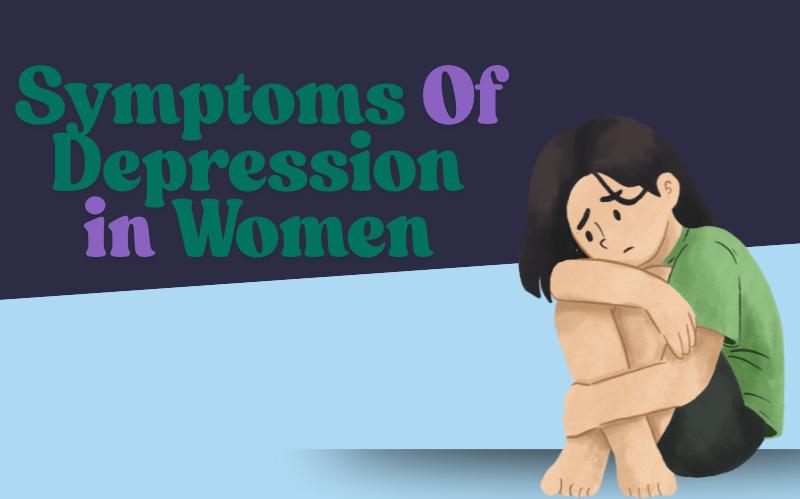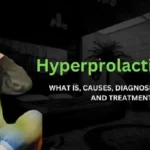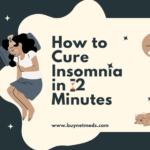Depression is shown to affect more women than men. About one in four females experience depression in the UK, compared with one in ten males. There are more risks for females because of hormonal changes, such as menopause or menstruation, biological influences, and social influences, such as gender discrimination or caregiver jobs-for-pay. Depression symptoms consist of tiredness, several days of sadness, loss of interest, and irritability. Early recognition of the symptoms would enhance support and treatment possibilities.
General Symptoms of Depression in Women
A woman’s depression is frequently characterized by constant sadness, tiredness, irritability, and lack of interest in the activities that the woman previously engaged in. Other symptoms include changes to appetite or sleep patterns, inability to concentrate, and guilt or worthlessness.
- Repeated hopelessness, constant crying, or emotional numbness is typical in the case of many women. Too many negative thoughts can hold them and make life unbearable. They may disengage from social interactions, retreating from friends and relatives since interactions are draining or meaningless.
- Exhaustion is part of everyday life, physical and emotional, and even the smallest task can feel exhausting. Sleep disorders such as insomnia or oversleeping, as well as appetite alterations (over- or under-eating), can exacerbate fatigue.
- When severe, depression can drive one to consider suicide or total inability to carry out anything requiring functioning, such as work, relationships, and taking care of oneself. Depression can also be indicated by such unaccountable physical pain, irritability, or guilt. It is essential for recovery to have early support and treatment.
Depression Linked to Reproductive Health
Depression can negatively impact reproductive health in a way that can cause problems with fertility, menstrual cycles, and sexual function. Stress and hormonal imbalance have been how most cases.
1. Premenstrual and Menstrual-Related Depression
Reproductive health and depression are linked in that one way or another, many women suffer from mood swings and emotional instability when their period begins.
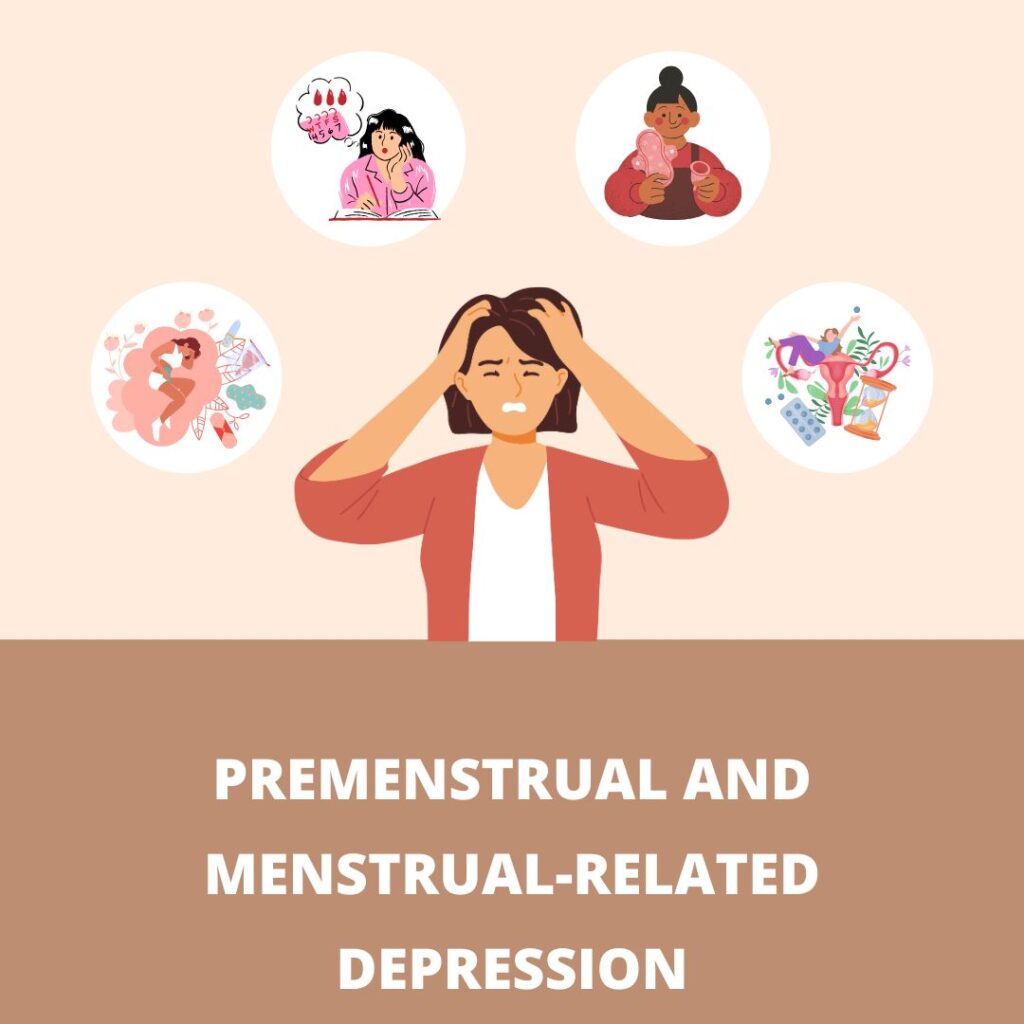
Premenstrual Depression (PMS): Numerous women have emotional changes, irritability, and sadness preceding their period, caused by low levels of estrogen and progesterone.
Depression During Menstruation: During menstruation, changes in hormonal levels only exacerbate mood swings, sap energy, and amplify symptoms of sadness because they interfere with neurotransmitter action, and sometimes even enable full-blown depression already taken hold.
Post-Menstrual Depression: Women have post-menstruation emotional lows, wherein it is often attributed to slowed hormonal balance or an extended aggravation of depression.
Hormonal & Neurochemical Factors: Decreased serotonin level associated with menstrual hormonal shifts can increase emotional vulnerability and provoke repeated depression in some people. These mood-related problems, fortunately, can be controlled by professional treatment or medication.
2. Pregnancy and Depression
Depression of pregnancy is a serious issue whose an impact on the mother’s health and the unborn baby’s physical growth. Changes in hormones, increased life stress, and emotional problem will aggravate depression during pregnancy and postpartum and affect the mother and the child.
Signs of Pregnancy Depression
Pregnancy depression tends to have severe anxiety, profuse sadness, and emotional stress. Untreated may damage the health of the expectant mother and the affected baby’s development, which is why early diagnosis and treatment are vital.
Risk Factors
Pregnancy women with a history of depression or reduced social support are likely to experience pregnancy depression. Conditions such as financial woes, the absence of social association, or some significant turn in life can make the conditions of anxiety and sadness worse.
Health Risks
Negligent depression during pregnancy may result in ineffective prenatal attention, and an increase in premature birth and low birth weight. It also goes on to increase the risk of postpartum depression, which can also prolong the future mental health of the mother and baby.
Anxiety and Depression
Depression during pregnancy is characteristically accompanied by anxiety, which causes long-term emotional turmoil. However, with professional help, therapy, counselling, or support groups, expectant mothers can find relief and better their outcomes.
Awareness of the signs and timely search for help can protect mothers’ health and improve the start of their babies.
3. Postpartum Depression (PPD) and Related Conditions
A mood disorder known as postpartum depression (PPD) involves new mothers, and it develops several weeks after birth. Not as common as the short-term “baby blues”, which occurs in the first four days following birth and soon resolves itself, PPD is longer-lasting and more severe, frequently intruding on a woman’s sense of emotional well-being. This condition doesn’t improve with hormone changes, stress, and lack of accompanying support after childbirth.
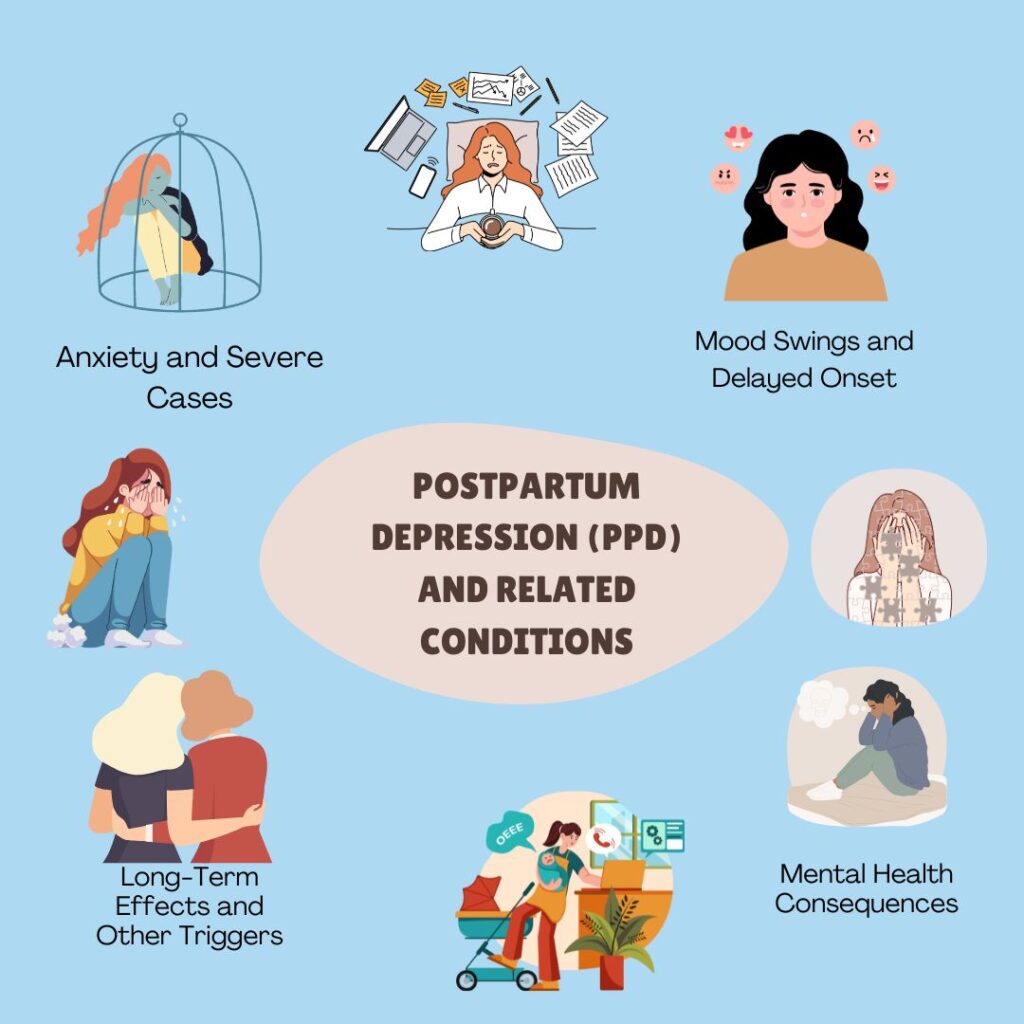
Symptoms and Signs
Women with PPD often experience:
- Overwhelming exhaustion
- A feeling of separation from their baby
- Persistent sadness
- Frequent crying spells
- Intense guilt or shame
- Difficulty bonding with their newborn
Anxiety and Severe Cases
Many PPD sufferers also have panic attacks and increased anxiety. At times rare and extreme, we could have psychotic PPD, which involves delusions or hallucinations – this calls for emergency medical attention.
Mood Swings and Delayed Onset
PPD may lead to experiencing sudden anger to profound sadness. Although it is typically present within a short period following childbirth, it may sometimes occur not earlier than six months postpartum, and leave both mothers and healthcare workers unaware of it.
Long-Term Effects and Other Triggers
Untreated, PPD symptoms may last more than two years. In addition, women with a past miscarriage may also develop PPD because of hormonal changes, grief, and emotional stress, even without a live birth.
Mental Health Consequences
PPD can ultimately lead to prolonged depression or anxiety disorders if left untreated. Recovery early depends on early recognition and support.
This reworked version clarifies, enhances flow, and readability while not excluding any critical information. Let me know if you would like some refinements!
4. Menopause and Perimenopause Depression
Reproductive health conditions, including the menopausal transition (perimenopause), can be linked to depression. As hormone levels fluctuate during this phase, women often experience mood swings, heightened anxiety, and worsening depressive symptoms.
- The shifting estrogen levels disrupt serotonin production, which plays a key role in regulating mood. This hormonal imbalance can lead to low mood, fatigue, irritability, and anxiety. Depressive symptoms—such as mood swings and irritability—may appear early in perimenopause, long before menstrual cycles stop completely.
- Physical symptoms like hot flashes and sleep disturbances further intensify emotional struggles, making menopausal depression more pronounced. For some women, particularly those with a history of mental health challenges, hormonal changes can trigger severe depression.
- Notably, depression related to menopause may persist even after hormone levels stabilize. Because of this, ongoing psychological support and medical care can be crucial in managing symptoms effectively.
Types of Depression Specific to Women
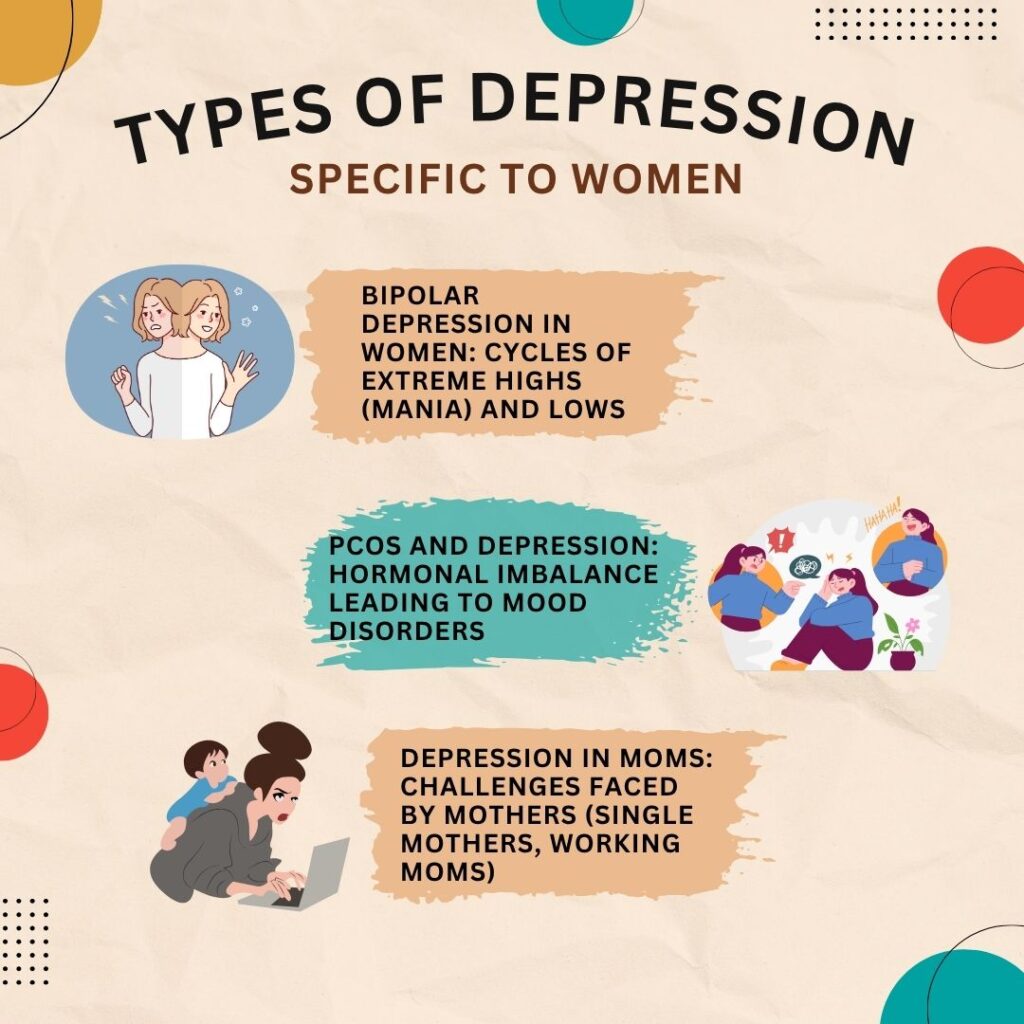
Bipolar depression in women: Cycles of extreme highs (mania) and lows
The bipolar depression in women is related to the severe form of bipolar disorder, characterized by alterations between the manic high and depressive low. Risk-taking behaviors, rapid speech, and extreme mood swings, particularly during hormonal changes, are associated symptoms women may experience. Menopause can aggravate these symptoms because hormone changes can trigger wild mood swings.
Postpartum bipolar depression is another vital issue, and childbirth can trigger either the manic or depressive condition. During such periods, prompt medical attention matters. Radical diagnosis and treatment are fundamental to properly managing these symptoms and improving life.
PCOS and depression: Hormonal imbalance leading to mood disorders
Depression types peculiar to them are likely to arise because of hormonal changes. Diseases such as polycystic ovary syndrome (PCOS) can predispose an individual to get into depression caused by hormone imbalance, insulin resistance, and chronic inflammation. Postpartum depression develops following the birth of a child, whereas perimenopausal depression begins at some point of hormonal shifts which precede menopause. PMDD is the underlying cause of mood swings resulting in extreme mood swings before the commencement of menstruation. Moreover, efforts by society, the previous trauma, and pressure to deal with their caregiving burden contribute to higher rates of depression in women.
Depression in moms: Challenges faced by mothers (single mothers, working moms)
The single mothers may face financial strain, loneliness, and accumulating debt. Working mothers are under continuous pressure as they try to combine careers and child-rearing responsibilities with little or no support. New mothers are the victims of postpartum depression, as the reason behind this situation is connected with hormonal processes and the challenges of the transition to motherhood. Furthermore, the perception of society to become the “perfect mother” can exacerbate feelings of guilt and self-doubt, causing chronic emotional exhaustion.
Risk Factors and Causes of Depression in Women
Depression in women may be the product of biological, psychological, and social factors. Hormonal changes – especially in the case of puberty, pregnancy, and menopause – dramatically raise the susceptibility. Genetic predisposition, with a history of trauma or chronic stress, is also significant. Other environmental factors, including lack of social support, financial strain, or essential life changes, also contribute to depressive symptoms.
Hormonal decrease, tiredness, and emotional difficulties of becoming a mother may lead to postpartum depression. The same applies when a woman goes through surgical menopause after a hysterectomy, as the sudden exposure to hormonal changes and the psychological effects of the surgery can induce depression.
Treatment and Support for Depression in Women
The management of depression in women involves more therapy, dosage of medicine, and lifestyle changes. Metal support by loved ones and resources from the community are also important in recovery.
- Medication Options: The SSRIs and SNRIs are common antidepressants that are given to women. However, the hormonal interactions should be considered to make the drugs effective.
- Postpartum Depression: Early intervention is essential, and it may take the form of therapy, medication, and support groups, helping people recover. Cognitive Behavioral Therapy, specifically, is mainly helpful in the case of postpartum depression and helps women change negative patterns of thinking.
- Perimenopausal Depression: The antidepressants can be helpful to women under the exposure of mood swings due to hormonal imbalance.
- Seeking Help: Professional assistance leads to more favourable results for either postpartum, perimenopausal, or general depression. Having a strong support network is also essential for long-term recovery.
Conclusion
Women’s depression is mainly characterized by chronic sadness, fatigue, irritability, and a lack of interest in activities. Other typical symptoms are a change in appetite, disturbance in sleep, lapse of concentration, and experiences of worthlessness. A person may suffer from physical pains, anxiety, and ideas of self-harm.
Bear in mind that depression is a disorder that can be recovered from, and help should be sought. Consider calling a therapist, contacting a helpline, and attending a support group. You are not alone: there is light at the end of the tunnel when in the right hands.

